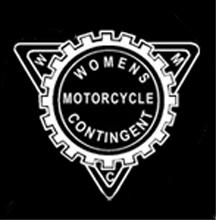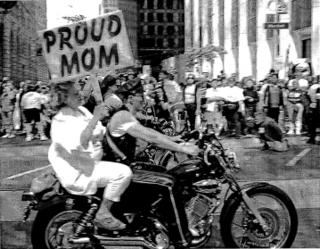TTABlog Predicts TTAB Reversal of "DYKES ON BIKES" Refusal
As noted at Marty Schwimmer's Trademark Blog and Patrick Guevara's Bridging The Gap last week, the PTO denied reconsideration of a Section 2(a) refusal to register the mark DYKES ON BIKES for "education and entertainment services in the nature of organizing, conducting, and promoting parade contingents, community festivals, events, street fairs, forums, seminars, parties and rallies to support, organize and motivate women motorcyclists everywhere to do the same, thereby fostering pride in a wide variety of sexual orientations and identities, namely lesbian, bisexual and transgender." (Application Serial No. 78281746). I doubt that the PTO''s refusal will survive an appeal.

The Examining Attorney deemed DYKES ON BIKES unregistrable under Section 2(a) "because the proposed mark consists of or comprises matter which may disparage or bring into contempt or disrepute to [sic] the lesbian, bisexual and transgender communities." Office Action of February 20, 2004. That refusal was made final on October 28, 2004, and on April 28, 2005 Applicant San Francisco Women's Motorcycle Contingent timely filed its notice of appeal along with a request for reconsideration. That request was denied on May 25, 2005. On July 18th, the TTAB issued an order requiring the filing of Applicant's brief on appeal within sixty days -- i.e., on or before September 16, 2005.
The Examining Attorney applied the disparagement test set out in Greyhound Corp v. Both Worlds Inc., 6 USPQ2d 1635 (TTAB 1988): "a disparagement claimant must show that the proposed mark (1) would reasonably be understood as referring to the disparaged party; and (2) is in fact disparaging, that is, would be considered offensive or objectionable by a reasonable person of ordinary sensibilities." Applicant argued that Greyhound [which concerned a design of a defecating greyhound dog, for polo shirts and T-shirt] applied only to commercial entities, and that for a group the proper test is set forth in the TTAB's "REDSKINS" decision, Harjo v. Pro-Football, Inc., 50 USPQ2d 1705 (1999), rev'd on other grounds, Pro-Football, Inc. v. Harjo, 68 USPQ2d 1225 (D.D.C. 2003):
"it is only logical that in deciding whether the matter may be disparaging we look, not to American society as a whole ... but to the view of the referenced group." 50 USPQ2d at 1739 (slip op., p. 100).
The Examining Attorney continued to cite Greyhound in making the refusal final, but she did point out that Applicant's own evidence includes a "dictionary" definition that "makes it clear that the term is offensive to the disparaged party in stating 'DYKE: The edgy alternative to lesbian, though use with caution. Some women (generally those 40 and older) still prefer lesbian and may deem Dyke a slur.'" [See Exhibit C to Applicant's Response of August 20, 2004, a three-page article entitled "The New Queer Dictionary" appearing in the 2004 Official San Francisco Pride Guide].
With its request for reconsideration, Applicant submitted a stack of declarations and exhibits, arguing that "dyke" is not disparaging to the lesbian, bisexual, and transgender communities. The Examining Attorney was not impressed: "The fact that a certain segment of the disparaged group has adopted the term and now seeks to obviate the vulgar context of the term does not overcome the Section 2(a) refusal."

TTABlog comment: Expect reversal of the PTO's refusal to register. The TTAB will surely agree with Applicant that Greyhound is not the proper test for disparagement of a group. The proper test is that of Harjo: whether a substantial composite of individuals in the group (not necessarily a majority) would find the term derogatory. On that point, the record contains a dearth of evidence.
The Examining Attorney submitted definitions of the word "dyke" from various on-line dictionaries (e.g., Merriam-Webster OnLine and Bartleby.com), but do those definitions show how members of the subject group consider the term? The Examining Attorney did cite an entry from "The New Queer Dictionary," but is that a recognized reference work? Even if it is, does that single citation suffice to carry the PTO's burden to establish a prima facie case of disparagement? All that definition says is that "some women (generally those 40 and older) still prefer lesbian and may deem Dyke a slur." [empahsis supplied]. Some may? Is that enough to prove that a "substantial composite" of the group in question considers DYKE disparaging? I don't think so.
Moreover, the Examining Attorney ignored another important point: the mark at issue must be considered in the context of its use. If someone were attempting to register DYKES ON BIKES for products blatantly insulting to the lesbian community, that would be an entirely different situation from this particular Applicant's attempt to register the mark for services offered by and directed to members of the supposedly disparaged group. As stated in Harjo, "the question of disparagement must be considered in relation to the goods or services identified by the mark in the context of the marketplace." (slip op., p. 109). Returning to the definition in "The New Queer Dictionary," would lesbian women 40 and over find disparaging Applicant's use of the word DYKE as part of a service mark for these particular services? Or is that definition referring to use of DYKE in other contexts?
In sum, I expect the TTAB to reverse this refusal to register because the PTO failed to establish a prima facie case that DYKES ON BIKES, when used in connection with Applicant's services, would be considered disparaging by a substantial composite of the relevant community.
Text Copyright John L. Welch 2005. All Rights Reserved.




0 Comments:
Post a Comment
<< Home